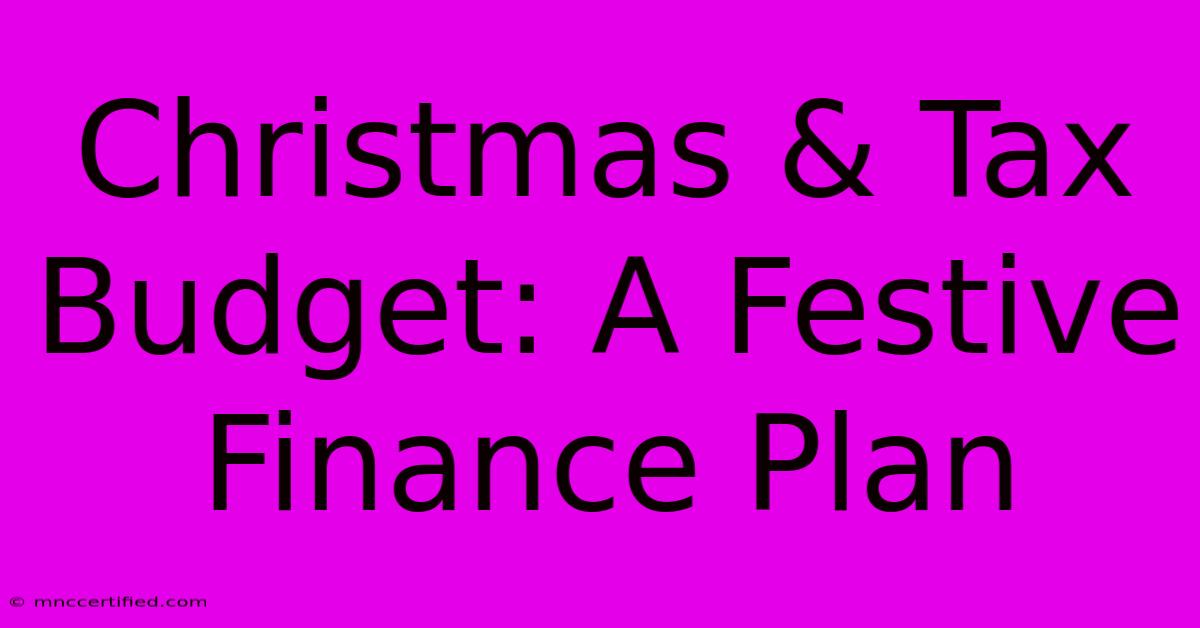Christmas & Tax Budget: A Festive Finance Plan

Table of Contents
Christmas & Tax Budget: A Festive Finance Plan
The holidays are a time for joy, family, and…financial stress? Don't let the festive season derail your financial goals. This guide helps you navigate the Christmas spending spree while staying on top of your tax budget. We'll explore strategies to maximize your holiday cheer without sacrificing your financial well-being.
Planning for a Festive & Financially Responsible Christmas
Christmas is undeniably expensive. From gifts and travel to parties and decorations, the costs can quickly add up. Proactive planning is crucial to avoid post-holiday debt.
1. Set a Realistic Christmas Budget:
Before you even think about twinkling lights, create a detailed budget. This isn't about restricting fun; it's about mindful spending. Consider:
- Gift budget: Allocate a specific amount for gifts, factoring in recipients and price ranges. Consider setting a gift exchange limit with family and friends.
- Entertainment budget: Account for parties, meals out, and festive activities.
- Travel budget: If traveling for the holidays, factor in transportation, accommodation, and potential extra expenses.
- Decorations & miscellaneous expenses: Don't forget the costs of decorations, wrapping paper, cards, and postage.
Use budgeting apps or spreadsheets to track expenses meticulously. Knowing where your money is going empowers you to make informed decisions.
2. Maximize Tax Benefits:
Don't forget the tax implications of your holiday spending. While most Christmas expenses are not directly tax-deductible, some related expenditures might be. Consult with a tax professional to ensure you are taking advantage of all possible deductions. This could include:
- Charitable donations: Donations to registered charities are often tax-deductible. Consider making a donation in lieu of a gift, or donating to a charity in someone's name.
- Business-related expenses: If you're a freelancer or small business owner, some holiday-related expenses might be deductible as business expenses. Keep thorough records!
3. Smart Shopping Strategies:
Avoid impulse buys and adopt strategic shopping techniques:
- Shop early: Avoid last-minute price hikes by starting your shopping early.
- Compare prices: Utilize online price comparison tools to find the best deals.
- Take advantage of sales and discounts: Look for Black Friday deals, Cyber Monday offers, and other promotional opportunities.
- Consider second-hand options: Explore thrift stores or online marketplaces for unique and affordable gifts.
- DIY gifts: Making homemade gifts is a budget-friendly and personalized alternative.
Integrating Christmas Spending into Your Yearly Tax Plan
The key is to view Christmas spending not as an isolated event, but as part of your overall annual financial plan.
1. Year-Round Savings:
Start saving for Christmas early in the year. Setting aside a small amount each month makes the holiday season less financially stressful. Automate your savings using direct deposit or a savings app.
2. Track Expenses Throughout the Year:
By monitoring your spending habits throughout the year, you'll have a better understanding of your financial capacity during the holidays. This aids in realistic budget creation.
3. Review Your Tax Situation:
Before the holiday season, review your tax situation with a financial advisor to optimize your deductions and plan for potential tax liabilities.
Conclusion: A Merry & Financially Sound Holiday
Christmas should be a joyous time, not a period of financial anxiety. By creating a detailed budget, maximizing tax benefits, adopting smart shopping strategies, and integrating Christmas spending into your yearly financial plan, you can enjoy the festive season without compromising your financial well-being. Remember, responsible spending and planning pave the way for a truly merry and financially sound holiday!

Thank you for visiting our website wich cover about Christmas & Tax Budget: A Festive Finance Plan. We hope the information provided has been useful to you. Feel free to contact us if you have any questions or need further assistance. See you next time and dont miss to bookmark.
Featured Posts
-
Mayweather Rejects Punch Claim In Fight
Dec 12, 2024
-
Sheffield United A Ticket Update
Dec 12, 2024
-
Actor Alexander Westwood Sex Crime Conviction
Dec 12, 2024
-
Exploring Maria Callas Biography
Dec 12, 2024
-
Lotterys Musicals 2025 Lineup Announced
Dec 12, 2024